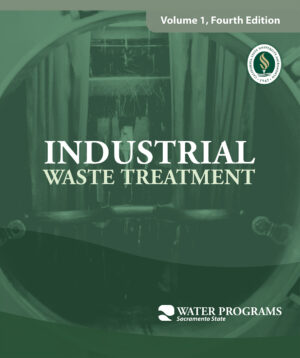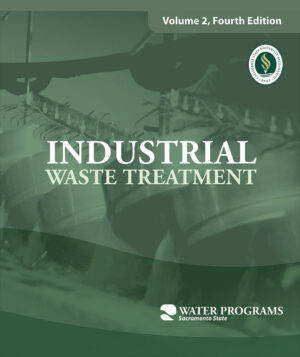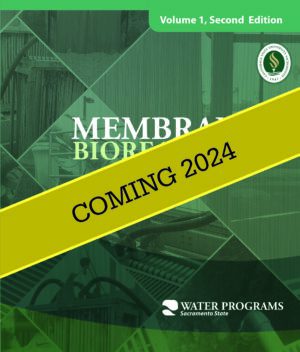“What else do you have?”
At the Office of Water Programs (OWP), we often get this question from operators who already have our flagship series, Operation of Wastewater Treatment Plants, and are looking for more educational opportunities. (The latest editions of the wastewater series are now available after updating and reorganizing it into 3 volumes, so check out owp.csus.edu if you haven’t seen those yet.) For operators who want to learn more, we encourage them to explore our specialty wastewater training manuals and courses.
We recently revised our Industrial Waste Treatment series (2 volumes) as well as Membrane Bioreactors. Industrial Waste Treatment, Volume 1, is available now. Volume 2 and Membrane Bioreactors will be available in early 2024.
The 2 volumes of Industrial Waste Treatment focus on safely and effectively using treatment processes and equipment to treat industrial wastewater and comply with applicable regulations for safe discharge to either a municipal wastewater collection system or the environment. Pretreatment inspectors also find these manuals helpful resources for understanding the systems they are evaluating at different industries (such as dairies, breweries, paper mills, petroleum refineries, and more). The processes and equipment used in industrial waste treatment are often similar to those used in municipal wastewater treatment, but the systems are applied in an industrial or pretreatment setting to comply with different regulations, including discharge limits, pretreatment regulations, and sewer-use ordinances.


Volume 1 introduces industrial waste treatment and includes discussions on water uses, waste discharges, pollution prevention, industrial wastewater sources, wastestream variables, regulatory requirements, and the role of industrial wastewater facility operators. Volume 1 also covers treatment facility safety, industrial waste monitoring, preliminary treatment, physical and physical–chemical treatment processes, metal wastestreams treatment, instrumentation and control, and facility maintenance. Volume 2 covers fixed film processes, activated sludge processes, nutrient removal, anaerobic treatment, and residual solids management. OWP offers distance learning courses for these training manuals that qualify for continuing education units (CEUs) in most US states and Canadian provinces.
 The new edition of Membrane Bioreactors offers up-to-date information about the process, equipment, and instrumentation of these systems that can meet increasingly strict discharge and reuse regulations. Because of these regulations as well as the system’s small footprint, membrane bioreactors (MBRs) are becoming more common in municipal wastewater treatment. This training manual presents information about system configurations, safety, process control parameters, commissioning, startup, treatment trains, disinfection, solids handling, maintenance, and troubleshooting. The information is meant to help operators understand how these complex systems work and how to use automation and instrumentation to meet operational and regulatory requirements. As with our other training manuals, an associated distance learning course is available.
The new edition of Membrane Bioreactors offers up-to-date information about the process, equipment, and instrumentation of these systems that can meet increasingly strict discharge and reuse regulations. Because of these regulations as well as the system’s small footprint, membrane bioreactors (MBRs) are becoming more common in municipal wastewater treatment. This training manual presents information about system configurations, safety, process control parameters, commissioning, startup, treatment trains, disinfection, solids handling, maintenance, and troubleshooting. The information is meant to help operators understand how these complex systems work and how to use automation and instrumentation to meet operational and regulatory requirements. As with our other training manuals, an associated distance learning course is available.
Our other specialty wastewater treatment training manuals and courses include Pretreatment Facility Inspection and Treatment of Metal Wastestreams. We also offer training manuals focused on small wastewater systems and wastewater collection systems. OWP’s full catalog of training manuals and courses for drinking water and wastewater treatment and conveyance operators, inspectors, and managers is available at owp.csus.edu/courses/catalog.
OWP is a self-supporting campus center at California State University, Sacramento, that delivers cost-effective solutions for protecting and enhancing water resources, public health, and the environment through training, scientific research, technical assistance, and public education.



